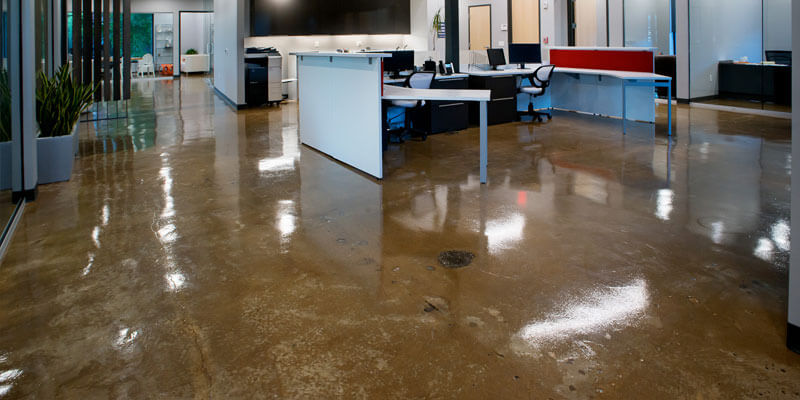If you’ve considered installing an epoxy floor in your home or business but have been deterred by myths and misconceptions, it’s time to set the record straight. In this article, we’ll provide valuable information on epoxy flooring and dispel the most common misconceptions about this type of surface.
Table of Contents
What is Epoxy Flooring?
Epoxy flooring is a type of floor coating made from a mixture of epoxy resin and hardener. Epoxy floors are known for their durability, chemical resistance, and slip resistance. This type of flooring is typically used in commercial and industrial settings but can also be used in residential homes.
The materials used to create an epoxy coating are typically applied in two or three coats. The first coat is usually a primer, followed by a base coat and a topcoat. Once the epoxy flooring has cured, it will form a hard, seamless surface that is easy to clean and maintain.
Where is Epoxy Usually Installed?
Epoxy floors are becoming increasingly popular in home kitchens and bathrooms due to their durability and easy maintenance. Epoxy flooring is most commonly installed in garages, commercial kitchens, warehouses, and other industrial settings. However, this type of flooring can also be used in residential homes.
What are the Benefits of Epoxy Flooring?
There are many benefits to installing an epoxy floor in your home or business. Here are just a few of the advantages of epoxy flooring:
– Durability: One of the biggest benefits of epoxy floors is durability. When properly installed and maintained, an epoxy floor can last for decades. This type of flooring is resistant to impact, scratches, abrasion, and chemicals.
– Easy Maintenance: Epoxy floors are easy to clean and maintain. This type of flooring does not require waxing or polishing, and it can be easily swept and mopped.
– Seamless Surface: Epoxy floors form a seamless surface impervious to dirt, dust, and spills. This makes epoxy flooring ideal for commercial kitchens and other industrial settings.
– Aesthetically Pleasing: Epoxy floors are available in various colors and finishes. This allows you to create an aesthetically pleasing and functional floor.
– Slip Resistant: Epoxy floors are slip-resistant, making them safe for use in areas with the potential for spills.
What are the Disadvantages of Epoxy Flooring?
While there are many advantages to epoxy flooring, there are a few disadvantages to consider as well. These disadvantages include:
– Expense: One of the biggest disadvantages of epoxy flooring is the expense. This type of flooring is more expensive than other types of flooring, such as vinyl or linoleum.
– Installation: Epoxy floors should be installed by a professional. While you can DIY an epoxy installation, it can lead to serious issues with functionality and longevity over time. This can add to the overall cost of the project.
– Temperature Sensitivity: Epoxy floors are sensitive to temperature changes. If the temperature is too cold, the epoxy will not cure properly. If the temperature is too hot, the epoxy will cure too quickly and may not bond properly to the surface.
Top 6 Misconceptions About Installing an Epoxy Coating
1. Epoxy Flooring Is Expensive
While epoxy flooring may cost more than some other types of flooring, it is an investment that will last for many years. In fact, epoxy floors are often less expensive in the long run because they do not require as much maintenance and repair as other types of flooring.
2. Epoxy Flooring Is Difficult to Install
Installing an epoxy floor is not as difficult as you might think. In fact, many DIYers can install their own epoxy floors with little to no difficulty. However, if you do not feel confident in your ability to install an epoxy floor, you can always hire a professional to do it for you.
3. Epoxy Flooring Is Not Durable
Epoxy floors are incredibly durable and can last for many years with proper care and maintenance. In fact, epoxy floors are often used in commercial and industrial settings because of their durability.
4. Epoxy Flooring Is Not Slippery
One of the most common misconceptions about epoxy floors is that they are slippery. However, this is not the case. Epoxy floors actually have a high level of slip resistance, making them safe to walk on even when wet.
5. Epoxy Flooring Is Not Chemical Resistant
Epoxy floors are highly chemical resistant and can withstand spills from most household chemicals. However, it is important to wipe up spills as soon as possible to prevent staining.
6. Epoxy Flooring Requires a Lot of Maintenance
Epoxy floors are remarkably easy to maintain. In most cases, all you need to do is sweep or vacuum the floor to remove dirt and debris. You may also need to mop the floor occasionally with a mild soap and water solution.
Installing an epoxy floor in your home or business can be a great investment. However, it’s important to dispel any myths or misconceptions you may have about epoxy floors before deciding. If you need any help with your epoxy floor installation, contact our team of dedicated professionals today.

